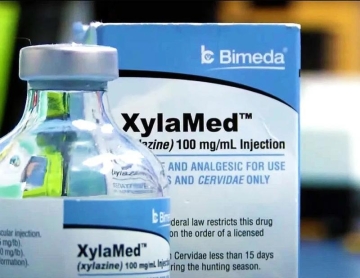January 23, 2024
Xylazine, also known as “Tranq,” is a non-opioid approved by the United States Food and Drug Administration for use in veterinary medicine as a sedative, anesthetic, muscle relaxant, and/or analgesic. It is not approved for human use as it can cause excessive central nervous system depressant effects, such as low blood pressure and sedation. However, human use of Xylazine — especially in big cities like Philadelphia — has increased since the early 2000s. Along with an increase in use, there has been a catastrophic increase in the number and severity of wounds associated with xylazine, and, with that, a lack of guidance for health providers about which interventions promote healing and prevent limb loss.
A new report by the Division of Substance Use Prevention and Harm Reduction (SUPHR) at the Philadelphia Department of Public Health, in collaboration with the Health Federation of Philadelphia’s Substance Use Response, Guidance and Education (SURGE) program, fills this void by providing recommendations for best-practices in the care for individuals with xylazine-associated wounds.
The recommendations cover 12 topic areas, including:
- Defining Basic Wound Care and Knowing when Advanced Wound Care is Needed
- Debridement
- Medication Management: Antibiotics
- Medication Management: Pain and Opioid Dependency
- Surgical Interventions: Skin Grafting and Amputation
- Wound Care Supplies
- Training and Resources for Providing Wound Care
- Communication Between Providers
- Misinformation and Stigma
- Billing and Coding for Wound Care
- Housing and Nutrition
- Patient Education
Physicians, surgeons, nurses, therapists, people with lived experience, and administrators committed their time to identifying best-practices for caring for people with xylazine-associated wounds throughout a year-long case review series hosted by SUPHR and SURGE. The case series, which reviewed the care of four individuals with xylazine-associated wounds, was presented by clinicians working in outpatient, street-based hospital and methadone treatment settings in Philadelphia. Each case and case discussion was summarized and reviewed by staff at SUPHR and SURGE, who then developed initial draft recommendations. A select committee of clinicians with experience providing care to individuals with xylazine-associated wounds was convened to review the recommendations, which were revised and finalized through an iterative process.
The full report, which includes 35 total recommendations, as well as vital information about wound care supplies, can be found here: https://hip.phila.gov/document/4132/Recommendations_for_Caring_for_People_with_Xylazine-Associated_Wounds_1.8.pdf
WATCH: Recommendations for Caring for People with Xylazine-Associated Wounds: Review and Panel Discussion
- SUPHR and SURGE held a webinar in early January to unveil the recommendations and have a panel discussion.
- Log in to post comments

